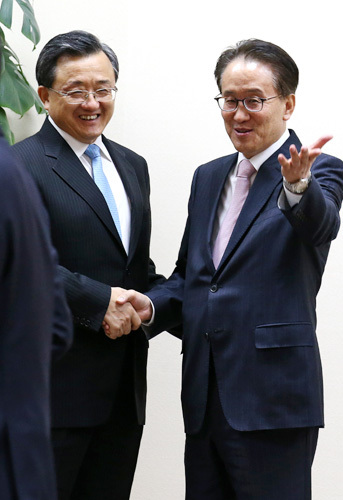Ranking diplomats from Seoul, Beijing set to have talks
By KH디지털2Published : March 16, 2015 - 10:13
South Korea's deputy foreign minister met with his Chinese counterpart in Seoul on Monday to discuss North Korea's nuclear program and bilateral issues, the foreign ministry said.
The meeting between South Korean Deputy Foreign Minister for Political Affairs Lee Kyung-soo and Chinese Assistant Minister of Foreign Affairs Liu Jianchao came amid a simmering Washington-Beijing row over an advanced U.S. missile-defense system and a China-led Asian development bank.
Liu, who arrived in Seoul on Sunday for a four-day visit, has been in charge of bilateral relations with Seoul, Pyongyang and Tokyo at China's foreign ministry since July 2014.

"The China-Korea relations are evolving as there have been vibrant exchanges at every level," Liu said at the start of the meeting.
He said that it is very important to strengthen exchanges and share opinions on global, regional and bilateral issues between China and South Korea this year.
Seoul's foreign ministry didn't disclose the meeting's agenda, but analysts speculated the two officials may discuss the possible deployment of an advanced U.S. missile-defense system on Korean soil and South Korea's potential joining of the China-proposed Asian Infrastructure Investment Bank.
China has explicitly voiced its opposition to Washington's possible deployment of a Terminal High-Altitude Area Defense battery in South Korea, apparently out of concerns the move may be aimed at containing a rising China.
Experts say South Korea's decision on the THAAD issue could unnerve either the United States or China.
Seoul and Washington have said that there has been no consultation or decision about the possible deployment.
U.S. Deputy Secretary of State Tony Blinken told reporters in Seoul last month that THAAD, if deployed, is aimed at exclusively dealing with the threat posed by North Korea, calling it a "purely defensive and good system."
In addition, the question of whether Seoul will join the AIIB is one of the hottest issues for Seoul-Beijing relations.
China launched the AIIB late last year with 21 nations as a counterbalance to the Asian Development Bank, led by the U.S. and Japan.
The U.S. has raised concerns about the AIIB, citing its lack of transparency in decision-making processes. Washington apparently has pressed its ally Seoul to be cautious about joining the regional bank.
Seoul plans to decide whether to join the AIIB soon as China has said the deadline to become a founding member of the bank is the end of March. Britain announced its plan last week to join the bank, becoming the first Western country to do so.
Liu's visit to Seoul also coincides with a planned trip by U.S. Assistant Secretary of State Daniel Russel.
Russel was to arrive in Seoul later in the day for a two-day visit, during which he will meet with his Korean counterpart Lee to discuss issues of mutual interest and to reaffirm their countries' strong alliance, according to the foreign ministry.
THAAD and the AIIB seem to be the highest on the agenda for the talks slated for Tuesday, according to government sources.
On Monday, Russel plans to meet with U.S. Ambassador to Seoul Mark Lippert, who is recovering after sustaining injuries in a knife attack early this month.
Lippert was slashed by anti-U.S. activist Kim Ki-jong on his face and wrist with a knife during a breakfast function in downtown Seoul on March 5, leaving the envoy with wounds that required 80 stitches. (Yonhap)


![[Exclusive] Korean military set to ban iPhones over 'security' concerns](http://res.heraldm.com/phpwas/restmb_idxmake.php?idx=644&simg=/content/image/2024/04/23/20240423050599_0.jpg&u=20240423183955)

![[Graphic News] 77% of young Koreans still financially dependent](http://res.heraldm.com/phpwas/restmb_idxmake.php?idx=644&simg=/content/image/2024/04/22/20240422050762_0.gif&u=)



![[Pressure points] Leggings in public: Fashion statement or social faux pas?](http://res.heraldm.com/phpwas/restmb_idxmake.php?idx=644&simg=/content/image/2024/04/23/20240423050669_0.jpg&u=)









